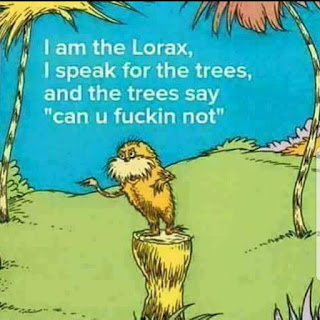This past week, a Facebook survey hit my feed asking whether the social media giant's service was of benefit to the world (which first appeared at least two years ago but has been seen regularly by users since January this year). I responded "disagree," because my immediate consideration was its role in being an easy platform for hateful and divisive people to exploit their First Amendment rights. Yes, it's also a way for caring and mindful people to share the insights of superb movers and shakers, such as Annie Leonard, the founder of The Story of Stuff Project, whose varied informational videos are thorough and detailed and worth every minute, and George Monbiot, the prolific journalist whose deep reads on the environment and natural world should be mandatory in every developed nation's schools. The ramifications, though, of the hatemongers slipping through the cracks will forever undermine all that good stuff. Lack of prevention of the very thing that landed Mr. Zuckerberg in the hot seat last summer--bots and fake accounts--has cost us greatly as a nation. Even with their six-part, 23-subsection 'Community Standards', I think we all sense Facebook's failure in being as beneficial as Zuckerberg thinks it is. Check out their statement pertaining to false news; have you ever observed "promotion of news literacy" in your feed?
Speaking of Monbiot and Leonard, today I re-read an oldie but goodie by Monbiot that a couple of friends happened to share on Facebook recently: his 2012 piece called 'The Gift of Death' in which he succinctly frames how we are trashing the living world at rates crazier than ever and all for nothing but stuff...junk. "Pathological consumption has become so normalized that we scarcely notice it." Our consumerism is rendered so normal by advertising and the media that we scarcely notice what has happened to us and our planet.
I also watched Leonard's Story of Stuff video for the fourth or fifth time since having first seen it in my Systems Thinking course at UNH in early 2008. It, too, surfaced in my Facebook feed today. (Too bad Facebook's survey didn't land in my feed today.) Leonard's storytelling is clear and concise, and I can't recommend enough her 21-minute video on how our system of consumerism is a system in crisis, and one in which we "are bumping up against limits at every turn."
As we approach the holiday season and the pressure of gift-giving, please consider Leonard's Story of Stuff and Monbiot's insight (both of whom had originally shed their insight in the month of December of their respective years). Instead of buying even more stuff for your friends and loved ones, "bake them a cake, write them a poem, give them a kiss, or tell them a joke, but for god’s sake stop trashing the planet to tell someone you care. All it shows is that you don’t."


































